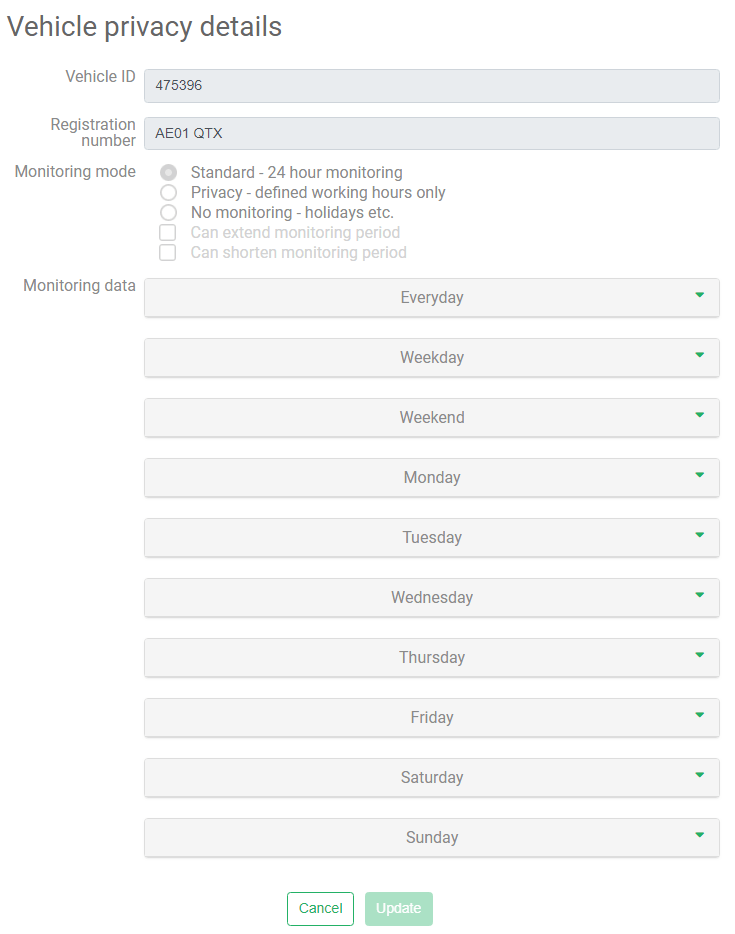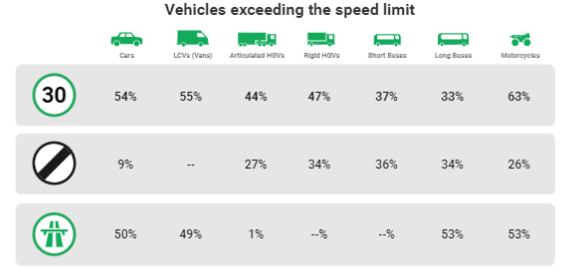See for yourself how Quartix works with our fully interactive real-time demo.
There are an estimated 276 million vehicles in the US. Although it’s difficult to give an exact figure, it’s safe to say that millions of vehicles are currently being tracked, for many different purposes, whether that be fuel savings, improved driver behavior and safety, or to improve customer service.
Every year, vehicle tracking technology advances further, and the ability to monitor vehicles becomes more accurate and precise. These advancements come with legal responsibilities for business owners and fleet managers.
But what exactly does US law say about vehicle tracking? What are the legal rights and limitations? And how do you protect your drivers’ privacy while ensuring your fleet vehicles are safe?
In this article, we’ll look at any laws or guidelines that apply to vehicle and driver monitoring and answer the following questions:
Which US laws impact vehicle tracking?
While there are no federal laws that regulate vehicle tracking, private citizens and business owners should be aware of this simple fact:
It’s generally legal to use a vehicle tracking device if you own the vehicles that are being tracked.
This applies to company vehicles that are being driven for business purposes. So, vehicle tracking for businesses is generally legal, but if you want to track a vehicle that you do not own, or if you track a vehicle that you are leasing, you will need to consider any legal implications, and these vary from state to state.

Are there any other guidelines or exceptions?
There are a few important questions to ask when you are tracking your company vehicles.
- Why do I want to track my vehicles?
- Have I informed my drivers that they are being tracked?
- What is my plan for keeping personal data safe?
These questions are important because while most states have not directly addressed or adopted statutes regarding vehicle tracking, some, like California and Connecticut, have already laid out rules.
- California requires employers to inform any person who is being tracked and to get their consent; failure to do so is an offense that could result in jail time.
- Connecticut prohibits monitoring employees without their knowledge.
More states seem bound to follow in the future.
Also, privacy laws are established and enforced throughout Europe. If your company works on the continent, you will have to have a plan in place to protect driver privacy, with documentation to prove you are adhering to European law.
For employers wishing to track vehicles that are owned by an employee, but used for business purposes, it’s a legal gray area. There have been cases, such as with New York City taxi drivers, that sided with the employer, stating that employees didn’t have an expectation of privacy because the state required GPS tracking in all cabs, even personally owned vehicles. (El-Nahal v. Yassky, 993 F.Supp.2d 460, 466 (S.D.N.Y., 2014).)
However, this was an isolated case and is not a codified law. Another case from the same state sided with employee rights and ruled that an employer was wrong to install a vehicle tracking device in a vehicle that was personally owned by an employee, despite the fact that the employee was suspected of falsifying time sheets. (Cunningham v. New York State Dept. of Labor, 21 N.Y.3d 515 (NY Ct. App., 2013).)
It’s very important to know the laws that pertains to your state.
What can I do to make sure my employees are on-board with vehicle tracking?
Being honest and up front with your employees about tracking your vehicles is the best policy. You have the right to track the vehicles that you own. Informing your drivers that they are being tracked is a good practice that demonstrates transparency and can go a long way towards building trust.
If you have their collaboration, you are also more likely to get them to respond to any feedback you provide them on their driving performance. At the same time, its best to also respect employee privacy rights – for example, if they take the vehicle home at night, you might want to configure your system so that other office-based employees are not able to see their home address. Or, if the employee is allowed to use the vehicle after hours, you may not want to track those times.
Best practices include:
- Being familiar with the laws for your state or any other states in which you operate.
- When possible, only using tracking devices in employer-owned vehicles, as tracking employees using their personally owned property is still a legal gray area.
- Make sure that, when using vehicle tracking, you are only doing so because there is a real need to track your vehicles.
- Create and employ a written vehicle tracking policy. This will make it clear to employees that they are being monitored in company vehicles and will notify them of any consequences for poor driving performance or use of company vehicles after hours, etc.
- Ensure that you store any vehicle tracking data securely.
Ultimately, if you own the vehicle, you have the right to track it, but collaboration and cooperation from your drivers is by far the best policy.
How can Quartix help?

Many vehicle tracking companies, Quartix included, have built-in features than can help you ensure you are complaint with whichever laws apply to your vehicle tracking situation. With the Quartix vehicle tracking system, you have access to:
Privacy controls – You can set multiple periods of time when your vehicles are not being tracked, to protect your driver’s privacy.
- Driver controls – The Quartix privacy app enables you give your drivers the ability to disable vehicle tracking when they are off work or on vacation, etc.
- Defining monitoring hours – Another aspect of privacy controls, these hours can be set up according to your business needs. You can establish different monitoring hours for weekdays and weekends, or have different settings for every day of the week.
Vehicle and driver data for our customers is stored for seven years by default, but there are options to set a shorter storage time. Only the previous 12 months of data is immediately accessible on the system, however. After a year, the data can only be accessed by request.
Whether you are preparing to track your vehicles for the first time or are just looking make sure you are tracking legally, it always best to find out what the vehicle tracking laws are in your state. Remember, you have the right to track the vehicles that you own, but you also have a duty to your employees to ensure that their private data is handled responsibly.



